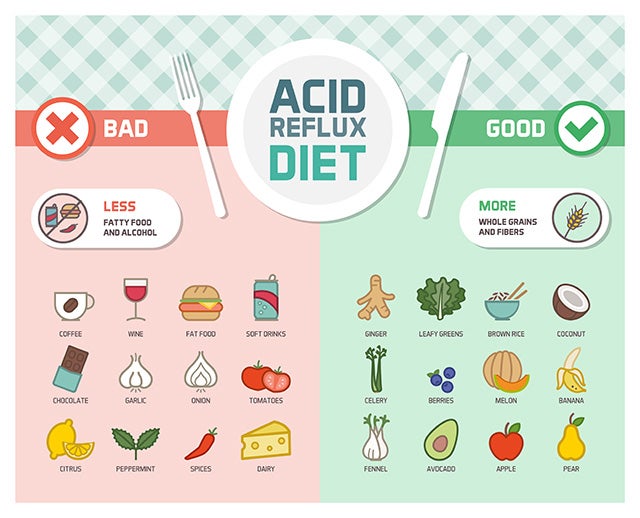Have you been losing sleep because your throat and chest are feeling a burning sensation? You may be experiencing acid reflux, which is a sign of GERD.
GERD is a common cause of sleeplessness that affects the rest of your physical and mental well-being. But certain sleeping positions, bed angles, and changes in your lifestyle can improve the quality of your sleep.
To relieve the pain and distress, we’ll show you several tips on how to sleep better with GERD and acid reflux.
What is GERD?
Gastroesophageal reflux disease, chronic acid reflux, or GERD is a typical disorder where the stomach substances flow back to the esophagus and throat. The esophagus is the tubular muscle that connects the stomach and throat.
Most of us experience acid reflux because it is normal, but only 20% of the US population has GERD. Acid reflux is normal unless you experience it more than twice a week despite taking medications. In this case, you might have GERD. Aside from acid reflux and regurgitation, constant heartburn is another symptom of GERD. It’s the burning sensation experienced in the chest which is a result of irritation of the esophagus lining. It usually occurs after eating or when you lay in bed.
Having GERD makes it hard to have a restful sleep because of the constant heartburn when you recline. It can develop at any age, although the risk of being diagnosed with the disease increases when you reach 40.
The risk of GERD development also increases if a person is obese, smoking, pregnant, or taking medications that result in acid reflux. Some may also experience chest pain, sensation in the throat, difficulty swallowing, chronic cough, asthma, and laryngitis when they have GERD.
If the symptoms persist, the tissues may eventually be damaged by the stomach acid, and your daily sleeping and eating habits are affected because of the pain. Overall, your quality of life worsens when you have GERD. One way to avoid the symptoms of chronic acid reflux is by raising your head while lying down through wooden blocks under the bed instead of extra pillows.
You might be interested in: Best Pillow For Acid Reflux
What is Acid Reflux?
GERD and acid reflux are sometimes used interchangeably, but they are not the same.
Acid reflux is the mild form of GERD, or a symptom of GERD, where the stomach acids leak back up to the esophagus. This back-flow is caused by a weak lower esophageal sphincter (LES), which is supposed to tighten the esophagus while the stomach processes the food you eat.
Acid reflux can also cause heartburn, sore throat, cough, bad breath, hoarse voice, bloating, sour taste in the mouth, and bitter taste in the throat. These may get more severe as you bend over or lie down.
79% of people experience acid reflux at night, causing sleep deprivation to 40%.
You can prevent acid reflux by avoiding certain foods and beverages, not lying down immediately after eating, and losing weight.
Sleeping on an incline is also recommended if you experience acid reflux. Wooden blocks, foam wedge support, and other bed risers can be used to achieve this. The guideline is for the head to be 6 to 8 inches taller than the feet when lying on the bed.
How to Sleep Better with GERD and Acid Reflux
GERD-related acid reflux awakens many of us because of the pain in the chest and throat. Here are some ways to sleep better with this condition.
— Stay Upright After Eating
Lying down immediately after eating can flare up your stomach and disrupt your sleep because the digestive system is still in the process of combining acids with the food you ate. This means quitting midnight snacks and eating your dinner early must be considered.
Wait for a minimum of three hours before you can lie down. Try doing other things like washing the dishes, strolling through the neighborhood, watching a show, or showering so that the stomach can process your meal. Any activity that keeps you upright will reduce the chances of acid climbing up your throat.
Avoid exercising before lying down as it increases your adrenaline and will give you a hard time falling asleep.
— Sleep on Your Left Side
Sleeping in the right position is a critical aspect of preventing GERD symptoms, and the best position is to lay on your left side.
The reason is simple: gravity. When you lay on your left side, the stomach stays at the bottom. It’s unlikely for the stomach acid to go up the esophagus and throat in this arrangement.
If acid reflux tries to occur, studies show that it will only be gaseous because the liquid acids will only go back down than when you lay on your back or right. Heartburn and refluxes are also less common and frequent when in this sleeping position.
— Avoid Back Sleeping
Most of us are comfortable sleeping on our backs. But this sleeping position should be avoided if you suffer from acid reflux or GERD symptoms every night.
Sleeping on your back can worsen the symptoms of GERD because the stomach acid easily flows from the stomach to the esophagus and throat because of the flat alignment.
Research also indicates that acid refluxes and heartburns tend to last longer and be more frequent when we sleep in this position. It worsens when you have a huge stomach because it gets heavily pushed down, causing the acids to leak.
— Avoid Sleeping on Your Right Side
If you’re not allowed to sleep on your back, why can’t you sleep on your right side as well?
The stomach is placed on the right side of the body. The stomach stays on top of the esophagus when you sleep on your right. This makes leaking more convenient because the acids simply go down and reach the esophagus lining.
Studies show that refluxes are more liquid and make you prone to choking when you sleep on your right. The acid also stays much longer in your esophagus because of gravity.
Avoid sleeping on your right to stop sleep interruptions caused by reflux distress.
— Incline Your Bed
Raise your head 6 to 8 inches when you lie down so that the acid reflux does not reach your throat. Try tilting your bed upward using bed risers instead of pillows so that your head stays higher than your feet.
Bed risers are often used to create space for storage under the bed. These are platforms in a column arrangement that you put right below your bed’s legs to make them taller.
Instead of placing bed risers on all legs, you should only place them under the top legs of the bed.
— Use a Sleep Wedge
Additional pillows are not recommended when elevating your head, but a wedge-shaped pillow will effectively resist the upward flow of the acid to your esophagus.
A sleep wedge helps manage refluxes and heartburns by keeping you in an upright and stable posture while limiting other movements and positions that may increase the risk of reflux symptoms.
Multiple pillows put your head in a position that pressures the stomach and triggers esophageal irritation. They may also cause you to slide down, which makes the back-flow of acid easier. While wedge-shaped pillows are available in most bedding stores, maternity shops also have them because pregnancy usually causes symptoms of GERD.
— Wear Loose-Fitting Clothes When Sleeping
Your outfit affects the occurrence of GERD symptoms, especially when you are sleeping. Don’t let your tight shorts pressure your abdomen and force the bile to reach your esophagus.
Wear loose pajamas instead to give your body enough room to perform its digestive function. Even an oversized shirt is better for bedtime instead of tight cycling, belts, shapewear, and other fitted clothing.
— Improve Your Sleeping Environment
Getting a good night’s sleep is hard when you have GERD. Aside from staying in the right sleeping position with the right clothes, fall asleep faster by making your room quieter and darker.
Block any noise and light that can delay your circadian rhythm and keep you awake at night after recovering from a flare-up. It’s also easier to fall back asleep if you have a comfortable mattress that conforms to your body contour without letting your head sink.
— Make Lifestyle Changes
- You must also make changes in your lifestyle so you can sleep better at night without experiencing chronic acid reflux symptoms.
- Instead of simply avoiding the attacks at night, solve the root cause by losing excessive weight, quitting smoking, and avoiding certain foods and drinks.
- Regular exercise can improve your sleep while helping you lose weight, which lessens the symptoms of chronic acid reflux.
- Eat in small yet frequent meals to stop your digestive tract from flaring up. Avoid foods and beverages like garlic, fried foods, chocolate, tomatoes, coffee, and alcohol.
- Some foods that can soothe the symptoms of acid reflux include vegetables, oatmeal, non-citrus fruits, and egg whites. Stay relaxed while eating so that the stomach doesn’t produce any more acid.
You might want to check: How Does Digestion Affect Your Quality of Sleep?
Relieve Nighttime Acid Reflux by Changing Your Sleeping Habits!
Just by laying down, your body may already trigger acid reflux. But the condition is manageable at night if you lay on your elevated bed with the right sleeping position.
We hope this has helped you catch some Z’s tonight. If you have more questions about GERD and sleeping, just leave a comment below.
Remember to elevate your head, sleep on your back, and wear comfortable clothes!
Photo credit: eggeegg/Shutterstock; JOKE_PHATRAPONG/Shutterstock;
9nong/Shutterstock; aslysun/Shutterstock;
elenabsl/Shutterstock; Nadya Lukic/Shutterstock;
Dragana Gordic/Shutterstock; Treetree2016/Shutterstock;
milatas/Shutterstock; aslysun/Shutterstock;
Alliance Images/Shutterstock













